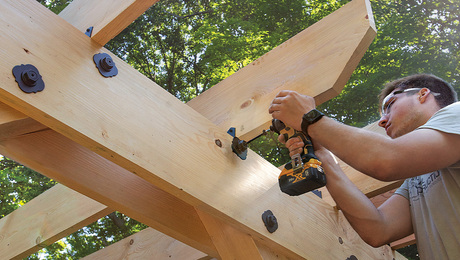Hi,
I’ve been reading the fine homebuilding book on running a construction company and basically it says you need 10 % of your gross for the year in cash in the bank at all times. So basically if I do a renovation, garage, and addition in a year that adds to about 350 I should have 35,000 in cash in the bank. I understand that this would be great to have but is it always resonable? The reason I’m asking is I’ve been pondering the idea of focusing on general contracting for a while now. I’ve been mainly a subcontracting business for 7 years now with a few general contracting jobs in there being my house and a large renovation. If I’m going to go that route I want to do it right thats why I’m reading this book. But the thing is I don’t see myself saving 20-30 thousand up anytime soon so I’m on the fence as to jumping in feet first or just staying as a general carpenter making a wage and getting by. Has anyone been teetering in this situation before and have any advice? Thanks very much.



















Replies
Speaking as someone not in the business (and not wanting to get into the business), I've seen many instances of contractors getting into money trouble and then digging themselves deeper and deeper as they attempt to recover. I don't know how much cash you need, but if you get into a situation where you're using the downpayment from project B to pay to finish project A then you're on a slippery slope. You need to make sure you'll have a chair if the music stops.
some of it depends on how you are organized as a business... sole prop.... chapter s..... llc , etc
you have a savings account for your personal life , right ?
if you are organized as a corp . or an llc.. you can lend money to the business form your personal account
you need cash flow to meet your obligations and to take advantage of discounts..
if you are late paying your bills....you pay interest... if you pay within discount terms you get credit
say you have vendor bills of $10K / month... 2% paid by 10th..... $200... x 12 months = $2400.
if you are late, maybe they charge you 5%... $500 interest x 12 months = $6000... that's a swing of $8400.
if you have positive cash flow, you can pay your subs when they do the work.. on time... the work gets done, they get paid... guess who your subs would rather work for and deliver timely completions... you.. paying on completion... or your competition... stringing them out 30 ------ 60---- 90 days ?
your payroll... the money has to be there....... and you should pay yourself first... YOU are the most valuable employee.. so the money... and the withholding taxes... and the insurance premiums...... all gotta be there...
your source of money can be savings.... or the bank... your customers should be your bank... you should never be their bank..
your payment schedules should reflect this... deposits... progress payments.... final payments
from day one ... you have to build and protect your reputation... for honesty... credit worthiness.... timely delivery of work
so.. yes .. you need working capital.... but you shouldn't be using your capital.. it should just be there
Thanks very much for the replies, I appreciate the advice. It seems having adequate working capital is one of the most important items in starting up. I sometimes feel that more work would come my way if I had better controls in place for general contracting (like employees, subs, etc.) so its tempting to jump right into that market, but if I quickly blow through my capital and go into debt like you mentioned that would be very bad. I guess I'll try to save as much as I can and hopefully someday I can do it right. Thanks.
I'm not sure it's a matter of having a lot of capital or meeting some specific benchmark so much as it is having some sort of discipline and carefully managing your cash flow. And, as always, a little bit of luck.
The unfortunate fact is that many (perhaps most) wood butchers are just not mentally equipped to be businessmen, and thus are better off working for others, one way or another. To be a successful building contractor having building skills is probably the least important trait. More important are management skills, accounting skills, and sales skills. Unless you have a wife, family member, or trusted associate who can fill out this list of skills, you'd better think VERY carefully before jumping in.
Working Capital
I know that money is tight right now, but have you talked to your friendly banker about establishing a line of credit. You would need to prepare a business plan, but you should do that anyway for your own benfit. You need a plan for getting the work, financing the work and doing the work. Often doing the work is the easiest part of it.
Good luck.
Cashflow budgeting
A business's cashflow is nearly impossible to forecast with certainty, even for the most experienced builder. But it can be done with reasonable accuracy if you sit down regularly and look at what is coming in and what is going out. You can enter those inflows and outflows in a spreadsheet like this one: http://office.microsoft.com/en-us/templates/cash-budget-TC101877504.aspx, or use quicken for business, or just do it by hand. Either way, it's important to remember that if your business has several projects ongoing with varying duration, your cashflow will inevitably rise and fall like a tide. Just because you are negative for one or two months, doesn't mean that you are not profitable overall at the end of the year...however, how you deal with those negative tides will determine whether you will be around long enough to capture those positive inflows down the road. It's tempting to go for extreme safety and say that you want x amount of dollars in the bank, to cover down months, but that's just guessing. There are other ways of dealing with temporary negative balances, including extending your payables (in return for paying a bit of interest to willing vendors), or tapping a line of credit with a bank. Family and friends may be willing to provide short term financing to you if you offer an attractive enough interest rate. My point is, don't just pick an arbitrary number for working capital...guidelines are guidelines. Get it all out on paper and do the math...then you'll begin to see where your expected negative cashflow periods are, and you can make plans to cover it with the least costly financing alternative you can find.
Whittlehome.com "Quality through the roof, since 1952."
For nearly 60 years, Whittle Construction has been a builder of top-quality homes, offering design-build residential and commercial services throughout the Rogue Valley of Southern Oregon.
"your payroll... the money
"your payroll... the money has to be there....... and you should pay yourself first... YOU are the most valuable employee.. so the money... and the withholding taxes... and the insurance premiums...... all gotta be there... "
I understand what you are trying to say by saying pay yourself first but legally you have to pay your employees. If that means you go without a draw, tough cookies. If you draw cash out of the business and don't pay your employees, you are in deep doo doo.
of course
you have to pay your employees... don't be daft
the problem comes that most small businessmen start treating the business as a hobby
it's a business... the guy running the operation is an employee just like all the rest
so the idea that you pay everyone else first is how you end the year with nothing ot show for it
you have to structure your business so that everyone gets paid... ESPECIALLY the boss
if you have to choose wether some employees will be paid and others will not be paid.. then you should close the doors
too often, companies postpone the inevitable by not paying the boss as the path of least resistance.
if the company cannot pay the employees , they should lay them off
they shouldn't rob peter to pay paul
the discussion is about "cash flow" and "working capital"
my point is that the product has to be sold at a price point that includes all overhead.. and paying the boss had better be included in that overhead
"even then thought I'd need
"even then thought I'd need 100K as a startup cushion, so did not start"
Wow...
Don't panic
I didn't have nor do I now, a hundred thousand to back my business.
However, I have a line of credit I could access that surpasses that by a long shot.
Reason being, the last time I went on my own (almost 25 yrs ago) I promised never to start more than I could finish and to never extend myself beyond my ability to cover. This meant not taking the plunge when "stick with me and you'll.........." was dangled in front of me.
I have remained one man with a fine group of reliable subs and only gross about a hundred fifty thousand a yr. Am I rich? no way. Am I poor? nope. It does take more to make more, question being how much you got and how much risk are you willing to take.
With the right payment schedule and the proper completion thing going on as well, you can stretch yourself a little bit more. DO NOT, go too far. Doesn't take much to stretch it till it tears and then the whole shebang falls apart.
A fluctuating economy doesn't offer much of a grace period.
Just rcvd a notice from a large roofing/window/kitchen supplier. They show price rise in the last yr for petrol based products including fuel-pvc, roofing, vinyl.....................each one averaging about 40 percent. Pretty damn volatal. You bid roof material and even after order, jumps in price b/4 delivery. The margin isn't that large on material markup to compensate for drastic changes.
You must include a proviso in your contract dealing with potential material cost rise. Otherwise, you might as well take your cash to the race track.
Best of luck.